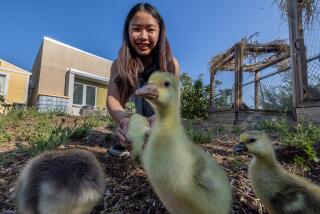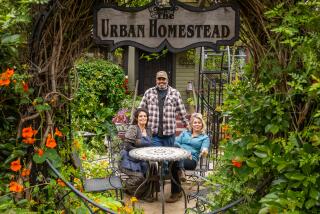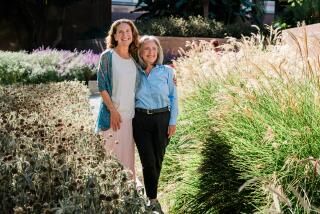CLIQUES : Urban Plowboys
- Share via
Remember 4-H, the club for kids who lived on farms? Four-H kids knew how to grow beachball-sized heads of cabbage that won county fair blue ribbons and how to raise tiny piglets into hogs the size of love seats. Four-H kids owned high rubber boots for slogging around in animal pens and they knew precisely what to do when a mare was foaling. City kids didn’t even know what foaling meant.
But while the countryside has shrunk and the suburbs and urbs have grown, 4-H (from the members’ pledge to put their head, heart, hands and health to good use) has kept apace. Today, 4-H kids are as likely to raise a snake on the patio or grow a mini-garden on the balcony as they are to raise cows on the farm. Animal husbandry is still the big ticket, but new programs reach out to poor and urban kids as well as suburbanites with limited space.
“Clubs are growing like you wouldn’t believe,” says Linda Araujo-Wilson, 4-H youth development adviser for Riverside County. Jane Chin, 4-H youth development adviser for Los Angeles County, says 2,200 youths are involved in the year-round clubs countywide, while another 5,000-plus kids--many from the inner city--join for short-term projects.
“I know it sounds like a cliche,” says Araujo-Wilson, “but we’re seeing a real upswing in family values that translates into an interest in 4-H. And by family,” she adds, “I mean whichever people a child is living with. You get the family focused on an activity and the kids really take off.”
Araujo-Wilson says members raise rabbits, guinea pigs, tropical fish and even ducks at home, “doing on a small scale what real farmers do.” Some teen-agers are breeding tropical fish for pet stores.
“Some of these kids don’t have the resources at home to do projects, so we work with schools and agencies like Head Start to start a mini-garden or a small pet project with a single animal,” Chin says. “We even have a horseless horse project, where a group of children adopt one horse and go visit it. They learn grooming, riding and horsemanship, and all about saddles.”
Finding adult volunteers has been a problem, though. “If a volunteer has a stable,” says Chin, “and is willing to work with kids and help the kids adopt and work with their animals, that would be a really great thing.”






